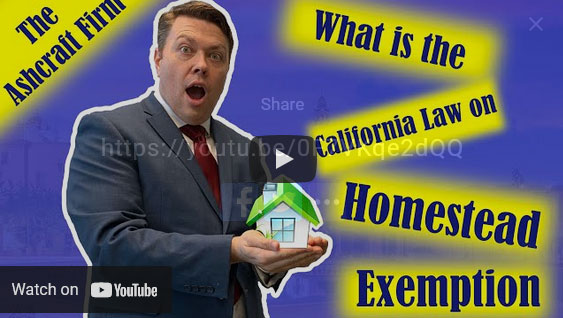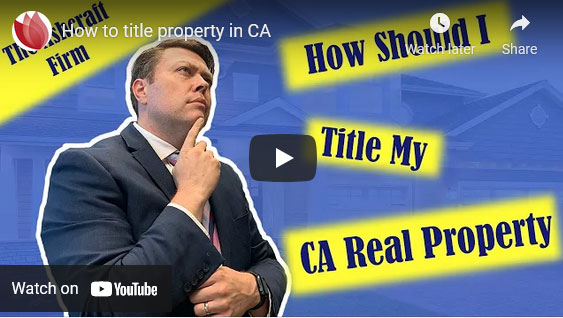
SHOULD YOU REAFFIRM YOUR MORTGAGE IN A CHAPTER 7 BANKRUPTCY?
October 10, 2020
What is the Homestead Law in California
May 10, 2021Today I'm going to be answering the question of how to title my California real property
Hi, I'm Greg with The Ashcraft Firm, and today we're going to be talking about how to title your property here in California. How do you title property in California?
There's a number of ways that I have listed here and I'll draw them out so that you can see how it is that each one of them works.
Tenants in Common
The first one, and this is the one that the law presumes about the property that you hold, is that you can hold your property as tenants in common. If you put nothing as far as titling goes the law is going to assume that you want to hold that property as Tenants in Common.
For example, let’s say you and your brother own a property and you own it as 50 percent share as tenants in common which means you each own that part of the property. You each can do whatever you want with your 50 percent share of the property. You can transfer that property to somebody else or you can transfer that share to a trust. If you pass away and you've done nothing to it and it's in your name as tenants in common then that's going to actually go to probate court and your portion of that property is going to be distributed the way the court says. That’s one way to hold property: as tenants in common.
Joint Tenancy
Another really common way is to hold your property as joint tenants. If you write this out it's called “Joint Tenants with Rights of Survivorship.” “Rights of survivorship” means if you pass away your portion of that property goes to the surviving person. If you hold that property as joint tenants, instead of tenants in common (each owning half), both of you own all of it. If you and your brother own property as joint tenants then, each of you owns the total of the property. The benefit of that is if one of you passes away and if you wanted that property to go to your brother when you pass away then it does that automatically. Well, you have to file an Affidavit of Death of Joint Tenant with the County Recorder where the property resides, but you don't have to go through a court situation and everything. It just automatically passes to the surviving joint tenant.
Example of Married Couple of Holding Property as Joint Tenants
Many married couples here in the state of California hold their property as joint tenants. There are downsides to holding property this way. One of the main downsides is taxes. When you buy a property let’s say you bought a property in the year 2000. Your property tax basis— let's say that you bought it for four hundred thousand dollars in the year 2000— so your property tax basis is roughly four hundred thousand dollars in that property. If the value of that property went up in 2020 to eight hundred thousand dollars, which wouldn't be out of the realm of possibility. You now have four hundred thousand dollars here that could potentially be taxed at capital gains rates. Now, if you hold it as joint tenants then you have the same basis in that property.
Community Property
Now, community property operates differently. If you are married you can hold property as community property and if one of you passes away, what happens is they say “okay well how much is this property worth when one of you passes away?” Let's say one of you passed away in the year 2020, then an appraiser said the property is now worth eight hundred thousand dollars. That's the new property tax basis. Let me calculate to show you how different that would be if you had to pay capital gains tax on about four hundred thousand. it’s going to be about 25 percent here in the state of California because we have both federal and state taxes which means that you would pay 25 times four hundred thousand dollars in taxes (one hundred thousand dollars). That's just a rough estimate. Now there are ways that you can increase or decrease that, based on how you file your taxes, but if you hold the property as community property you get a “step-up in basis” when one person passes away. This means you would not pay anything in taxes so you just saved a hundred thousand dollars by owning your property as community property.
Community Property with Right of Survivorship
Now, this brings me to the next way you can hold property and this has the tax benefits of community property and the rights of survivorship benefit in joint tenancy. This is community property with the right of survivorship and this hasn't been around forever, but it has the tax benefit— it gets that step up in basis. If one of you passes away the other one can sell the property and even if you had a tax basis that was this low it was only half of the value of the property now, when one of you passes away it gets a full step-up in basis so you have to pay zero in taxes. But we also have the “rights of survivorship” here with this community property with rights of survivorship and that means that this not only gets the tax benefit but it's passed without any court supervision. Meaning, you don't have to pay any court fees and you don't have to pay any taxes. If you're married, this is the second-best way to title your property and I say the second best because the very best way to hold property is in trust.
Holding Property in Trust avoids potential tax problems and Probate Court for generations
Holding property in community property with the right of survivorship can avoid probate court for your spouse, but it cannot avoid probate court for your beneficiaries, your kids, or your charities. If you hold your property in trust, you can title the property in any way. For example, let’s say that you hold your property as community property. You have all the tax benefits accompanied with holding your property that way. Then, let's say you take that community property with the right of survivorship and transfer it into a trust now you have all the tax benefits that we talked about here, it passes without any probate court for your spouse, but then it can also pass without any court to your beneficiaries and you can even set it up so that it will pass down without probate to let's say your grandkids and it can keep going.
Holding Property in Trust also Allows for Remarriage Protection
Now there are further benefits to holding property and trust that don’t deal with avoiding court and don't deal with avoiding negative tax consequences. You can also set up plans so that it protects you in case of remarriage. If you're married and one spouse passes away and the other one gets remarried we can require a prenup to be signed, etc.
Holding Property in Trust can have other benefits
It can also protect your kid's inheritance from any of their predators. Another thing we didn't talk about earlier that's a benefit of holding property in the trust is let's say you're not passing away. Let's say you have incapacity issues and you don't have your mental faculties about you. A trust-based plan can plan for that as well. No matter how you title your property on your deed, if something happens to you and you have no mental capacity then you're going to have to go to court. You're going to have to go to probate court anyway to deal with that so there's a lot of expenses and government hoops associated with taking over in case of incapacity.
There are other benefits to titling your property in a trust, too. You have a lot of control over your property. It's all private. In probate, it's all public record. If the property goes through probate court everybody knows (it’s all public record) but here it's all private so the only people that know are the people that you’ve selected in your trust so there are lots of benefits to holding it and trust. This is why I say the second-best way to hold your property, if you're a married couple, is to hold it as community property with the right of survivorship.
If you haven't set up a trust yet typically that's the way to hold it. Now, this isn't legal advice. I am a lawyer, but I can't give you legal advice because I don't know your situation so if you want to know more about that then you can contact us and we can actually talk to you about what's going on with your situation and talk to you about which way is the best way to hold properly
Contact Our Certified Probate & Estate Planning Attorneys
Thanks so much for watching I'm Greg with The Ashcraft Firm and as always if you have any more questions or anything like that feel free to call us to set up an appointment. If you're here in California and you don't live in California, we recommend finding an estate planning attorney in your area to discuss these issues because there are all different tax ramifications and all different ways to title your property if you live in a different state especially a state that does not have community property laws.


